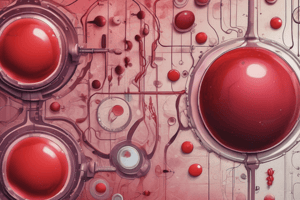Podcast
Questions and Answers
What is the primary purpose of wearing gloves when dealing with blood?
What is the primary purpose of wearing gloves when dealing with blood?
- To protect the gloves from blood stains
- To prevent infection from blood-borne pathogens (correct)
- To enhance the visibility of blood samples
- To improve dexterity when handling blood samples
What is the function of the reagent buffer in the ABO blood group system?
What is the function of the reagent buffer in the ABO blood group system?
- To react with the antigen on the surface of red blood cells (correct)
- To identify the ABO blood group
- To separate the serum from the blood cells
- To store the blood samples
What is the total number of blood groups, considering both ABO and RhD?
What is the total number of blood groups, considering both ABO and RhD?
- 6
- 4
- 8 (correct)
- 12
What is unique about blood type AB in terms of antigens and antibodies?
What is unique about blood type AB in terms of antigens and antibodies?
What is the name of the scientist who first identified the different blood types?
What is the name of the scientist who first identified the different blood types?
What is the purpose of adding the reagent buffer in the Direct Method?
What is the purpose of adding the reagent buffer in the Direct Method?
What is the purpose of the 70% alcohol provided in the ABO blood group system?
What is the purpose of the 70% alcohol provided in the ABO blood group system?
Why is it necessary to sanitize the finger before pricking in the Direct Method?
Why is it necessary to sanitize the finger before pricking in the Direct Method?
What is the name of the container used to dispose of used sharps?
What is the name of the container used to dispose of used sharps?
What happens if the blood cells stick together in the Direct Method?
What happens if the blood cells stick together in the Direct Method?
What is the purpose of adding one drop of serum to two wells of the dented plates in the Indirect Method?
What is the purpose of adding one drop of serum to two wells of the dented plates in the Indirect Method?
Why is it important to disinfect the work area with 70% Ethanol at the end of the practical?
Why is it important to disinfect the work area with 70% Ethanol at the end of the practical?
Flashcards are hidden until you start studying
Study Notes
ABO Blood Group System
- The ABO blood group system is used to classify human blood based on the inherited properties of red blood cells, determined by the presence or absence of antigens A and B.
Requirements and Precautions
- Wear protective clothing and gloves when handling blood to prevent infection.
- Wash hands immediately after removing gloves.
- Treat human blood as infectious and dispose of used sharps in a sharps container (yellow bucket).
Blood Types
- There are four possible blood types: A, B, O, and AB.
- Each blood type can be either RhD positive or RhD negative, resulting in a total of eight blood groups.
Characteristics of Blood Types
- Blood type A: contains antigen A on red blood cells and antibody B in serum.
- Blood type B: contains antigen B on red blood cells and antibody A in serum.
- Blood type AB: contains antigens A and B on red blood cells and no antibodies in serum.
- Blood type O: contains no antigens on red blood cells and antibodies A and B in serum.
Procedure (Direct Method)
- Mix blood sample with antibodies A and B.
- Check for blood cells sticking together, indicating a reaction with one of the antibodies.
- Use the ERYCARD test device and follow the instructions:
- Sanitize the finger to be pricked.
- Hold the loop in a vertical position.
- Prick the finger with a safety lancet and collect the sample on the collection loop.
- Dispense the sample on the sample pad.
- Add the reagent buffer after 2 minutes.
- Interpret results after 3 minutes.
Procedure (Indirect Method)
- Mix antibody A and B with the blood sample.
- Check for blood cells sticking together, indicating a reaction with one of the antibodies.
- Add a drop of serum to two wells of the dented plates.
- Add a drop of the blood sample and agitate the plate.
- Interpret the results.
Studying That Suits You
Use AI to generate personalized quizzes and flashcards to suit your learning preferences.




